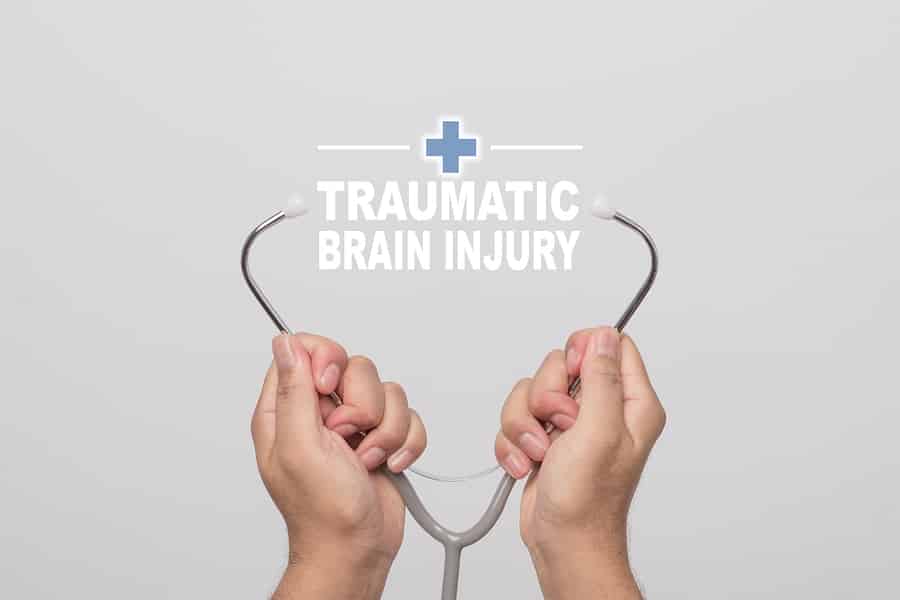Traumatic Brain Injury is an acceleration-deceleration brain injury most commonly caused by car accidents, blast trauma during combat, and severe sports injuries. There is first a direct injury—the acceleration—and then a rebound injury, when the brain moves within the skull. Concussions are a mild form of traumatic brain injury, or TBI. The parts of the brain most significantly affected are those that process attention, memory, and learning. Deficits in these areas of higher brain function can be devastating, and can significantly impact daily life.
Research into treatments falls into two categories: neuroprotective and neurorestorative. For those who are at high risk of TBI, such as professional boxers and football players, and soldiers in combat, neuroprotective treatments are hoped to reduce the severity of symptoms and improve recovery after an injury. Neurorestorative treatments are drugs, physical treatments such as cold, and neuropsychology therapeutics, which involved finding ways to deal with the realities of new memory states and behaviors. The goal of the neurorestorative treatments is bringing back functional capacity for those who have sustained an injury.
All of the clinical and preclinical research into neuroprotective therapies has failed to find a preventive treatment. However, clinical trials for neurorestorative treatments, those for after an injury, have found several promising leads with drugs, functional therapies, and stem cell treatments. In all instances, clinical research shows that the sooner after an injury multidisciplinary rehabilitation begins—physical rehab, neuropsychology, psychiatry, and therapies for memory and concentration—the better the long-term outcome. Indiana University Medical Centers have an international reputation as leaders in this multidisciplinary approach, as well as a leadership role in clinical research studies.
When we consider an injury to the brain, we have injuries to both the physical brain and the mind. The way the brain functions impacts the way we think, remember, and behave. Interventions for an injury can fall into physical medicine—therapies that work on the physical brain—and thinking therapies, such as counseling and instruction to learn new ways to form memories, adjust mood and feelings, and concentrate. Those who pursue a complete program that targets both the brain and the mind with their therapies have an improved chance for a better outcome.
New clinical research studies have been focusing directly on the brain injury: either restoring function to injured areas of the brain, or altering the trajectory of the injury’s effects. The “injury cascade” is a series of events that occur after a brain injury, one following in sequence after the other, in a type of negative feedback loop. The snowball starts to roll down the hill, picking up rocks and sticks as it goes. If we can stop the snowball halfway down the hill, it doesn’t have time to pick up the rocks. This is the theory behind drugs that interrupt the injury cascade.
Stem cells are precursor cells, and can change as they develop into the cells we need—specifically new brain and nervous system cells. While fetal stem cells are not being studied in clinical research, bone marrow stromal cells are being used in several clinical studies to evaluate the effectiveness of regenerating the brain with stem cells. The bone marrow stromal cells have been implanted into the brains of mice in a number of different studies, and have been shown to help the injured brains recover function and plasticity.
Erythropoietin is another blood progenitor cell, more easily available and administered than bone marrow stromal cells. Erythropoietin in infused into the abdomen, where it can diffuse across the blood-brain barrier. This treatment has had a significant amount of success in neurogenesis, or new tissue growth in the brain. This treatment is considered one of the most promising.
Two drug trials show promise at interrupting the inflammatory response during the injury cascade. Inflammation can lead to brain swelling and fluid retention, and higher rates of inflammation are associated with poor outcomes. A study at Emory using progesterone, a hormone, as a continuous infusion after an injury, reduced inflammation and brain swelling and shows promise in functional outcomes. Other clinical studies using statin drugs show a reduction in inflammatory response, oxidative response, and platelet activation, along with improved neurogenesis. With both of these early stage clinical trials, patients treated with these drugs immediately after an injury have better long-term recoveries.
One further study using immediate hypothermia has shown decreased residual damage to memory, attention, and concentration. Various methods of inducing hypothermia safely are still being trialed. Drug trials using methylphenidate and other stimulants have shown variable results, and are not recommended for use at this time. While concentration and memory showed some functional improvement, these drugs had negative effects on behavior in a significant number of adult subjects.
The most promising new research studies involve erythropoietin, bone marrow stromal cells, progesterone, and statins.
Do you have more questions about traumatic brain injury, or have you or someone you love been the victim of a TBI? Please contact us at (317) 636-0808 for more information.




